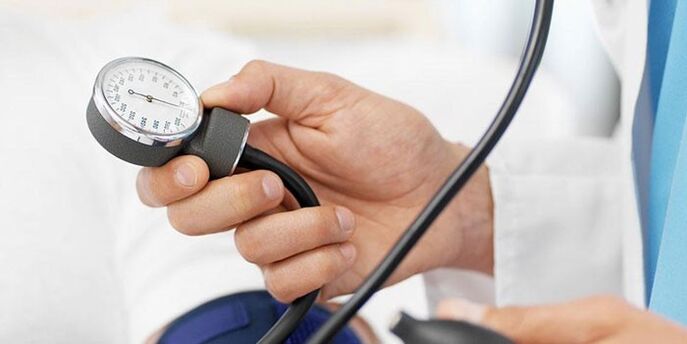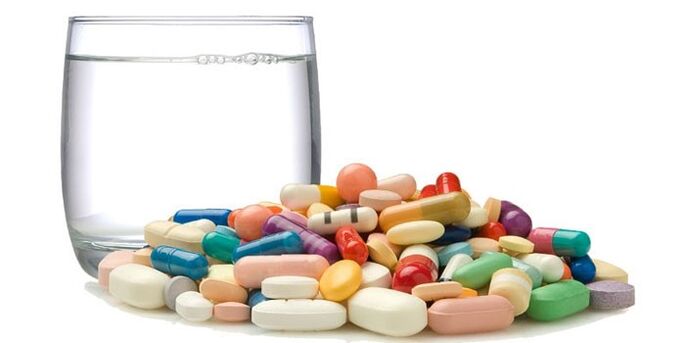Hypertension is the most common cardiovascular disease, and its symptoms affect the majority of the population after the age of 60-65. The diagnosis has several names, including essential hypertension (AH), arterial hypertension (AH). The disease is chronic, and each patient's main task is to avoid exacerbations and prolong remission (symptom disappearance) using both pharmacological and non-pharmacological methods.
What is high blood pressure
Arterial hypertension is a sustained rise in blood pressure above acceptable levels (starting at 140/90 mm Hg) under the influence of predisposing factors. This diagnosis is known as the "silent killer". The pathological process takes place in an asymptomatic form for a long time, but during an attack it significantly increases the risk of stroke, myocardial infarction and other dangerous diseases. Potential complications of GB can be life-threatening, so the disease requires prompt diagnosis and adequate treatment.
The development of hypertensive disease is due to the dysfunction of higher neurohumoral regulatory centers, kidneys, and blood vessels. In the absence of prompt treatment, the pathological process leads to organic and functional disorders of the heart, central nervous system organs and kidneys. Choosing the wrong therapy can lead to disease progression and increased pain.
Classification of high blood pressure
In 2003, a harmonized classification of hypertension was defined according to the severity of the disease. The determinants in this division are considered true indicators of blood pressure, as determined by tonometers in specific clinical cases. Hypertension is also classified by origin (primary, secondary), stage (transient, stable, sclerosing) and risk level for cardiovascular disease. This classification simplifies diagnosis and helps to more accurately determine treatment options for each person with hypertension.

degree of arterial hypertension
As blood pressure (BP) rises, it is suspected that arterial hypertension is worsening, especially if this health problem cannot be addressed by non-pharmacological means. It is important to know that the optimal blood pressure is 120/80 mm Hg. Art, Normal - 120-129 mmHg. Art. (Systolic Blood Pressure - SBP) and 80-84 mmHg. Art. (Diastolic Blood Pressure - DBP), High Normal - 130-139 mm. room temperature. Art. (sad) and 85-89 mm. room temperature. Art. (dad). Deviations from these numbers indicate a serious condition in the body. Doctors distinguish 3 grades of GB:
- Degree 1 (mild) hypertensive disease is characterized by unstable pressure ranging from 140/90 to 159/99 mmHg over several days. Art. The risk of developing hypertensive crisis is minimal, with no symptoms of organic damage to the internal organs and central nervous system. In order to suppress pain attacks, in addition to taking medication, patients also need to rest and eliminate stressful situations. Positive emotions, a walk in the fresh air is especially helpful.
- Grade 2 arterial hypertension develops rapidly. The blood pressure index ranges from 160/100 to 179/109 mmHg. Art, has symptoms of hypertensive crisis (cold sweats, goose bumps, flushing). Patients worry about migraine attacks, dizziness, poor sleep, and shortness of breath. Clinical manifestations of hypertension: transient cerebral ischemia (decreased blood flow to organs), increased creatinine in the blood, narrowing of retinal arteries, left ventricular hypertrophy (increased size), microalbuminuria (protein detected in urinalysis). It is impossible to normalize the condition without medication.
- Third-degree (severe) hypertension is accompanied by a sharp loss of vision, poor memory, and episodes of tachycardia (rapid heart rate). Hypertensive crisis occurs. BP Indicator - Starts at 180/110 mmHg. Art. and higher. Possible complications include hypertensive encephalopathy, cerebral vascular thrombosis and aneurysm (pathological dilation of blood vessels), left ventricular heart failure and renal failure, hemorrhage (bruising), and swelling of the optic nerve. Pathological changes are irreversible.
Cardiovascular risk level
To predict the likelihood of progressive arterial hypertension complications, the first step is to determine a cardiovascular risk index. This requires expert advice and complex diagnosis. The conditions (physiological and pathological) that caused the recurrence, taking into account the degree of hypertension. Common risk factors are:
- smoking, other bad habits;
- high cholesterol in the blood;
- a sedentary lifestyle;
- Obesity, including the abdomen (where most fat is deposited);
- Age (65+ for women, 55+ for men);
- Fasting glycemic index 5. 6-7. 0 mmol/l;
- Impaired glucose tolerance, determined using special tests;
- Cardiovascular disease in relatives;
- male.
If, in addition to high blood pressure, there are concomitant chronic diseases, the patient is at high cardiovascular risk:
- diabetes;
- heart failure;
- Violation of lipid (fat) metabolism;
- Bronchial Asthma;
- extensive damage to the retina;
- coronary artery disease;
- Stage 4 renal failure;
- stroke;
- Cerebrovascular disease (brain blood vessel damage);
- signs of peripheral arterial occlusive disease (atherosclerosis) of the lower extremities;
- Damage to other internal organs.

This information helps doctors predict the clinical outcome of the disease. To determine cardiovascular risk indicators for each degree of hypertension, you need to be familiar with the following table:
| General Risk Factors (RFR) | blood pressure | 1st degree risk of hypertension | Secondary arterial hypertension, risk | High blood pressure level 3 risk |
|---|---|---|---|---|
| no risk factors | ordinary risk | short | ease | High |
| 1-2 | short | ease | medium to high | High |
| more than 3 | mid Lo | medium to high | High | High |
| Damage to other internal organs, stage 3 kidney disease, diabetes | medium to high | High | High | very high |
| CVD, stage 4 chronic kidney disease with other organ involvement or common risk factors | very high | very high | very high | very high |
Treatment of high blood pressure
GB is classified according to stage and risk, which can help to correctly determine the drug treatment plan, quickly relieve pain onset, and prolong the period of remission. If primary arterial hypertension develops (isolated), the prognosis is favorable according to medical advice. Secondary forms of the disease are often accompanied by complications.
If the condition is not cured in time, it is difficult to stabilize high blood pressure even with medication. If grade 1, 2, or 3 hypertension is diagnosed, the general advice from experts is as follows. . The drug should be taken as prescribed by the attending physician to supplement:
- Follow a therapeutic diet. It is important to reduce your salt intake and enrich your daily diet with potassium and magnesium foods to strengthen your heart muscle (seeds, nuts, legumes and grains, vegetables).
- Say goodbye to bad habits. This applies not only to drinking and smoking, but also to increasing physical activity, ditching a "sedentary" lifestyle, and the need to walk in the fresh air.
- Weight control. If hypertensive patients are obese, they should abandon greasy, fried, and smoked foods and arrange fasting days regularly.
- physiotherapy. To prevent and prolong remission from GB, 30 minutes of moderate-intensity physical activity 5 times a week is recommended.
- Receive a multivitamin complex. The composition of such medicines should contain potassium, magnesium, iron and other trace elements important to the body.

medical treatement
Oral medications depend on the degree of high blood pressure and associated symptoms. The following are the best options for conservative treatment of arterial hypertension:
- In mild stages of disease, patients are prescribed angiotensin-converting enzyme inhibitors, angiotensin receptor antagonists, calcium channel blockers.
- If arterial hypertension of degree 2 risk 4 occurs, an integrative approach is required to address the issue, which combines multiple representatives of different pharmacological groups in one conservative treatment regimen. These are the aforementioned drugs used in combination with thiazide diuretics.
- In the complex course of this disease, in addition to the above-mentioned drugs, doctors recommend the use of alpha- or beta-blockers. This is required if the frail body cannot tolerate high doses of diuretics).





















